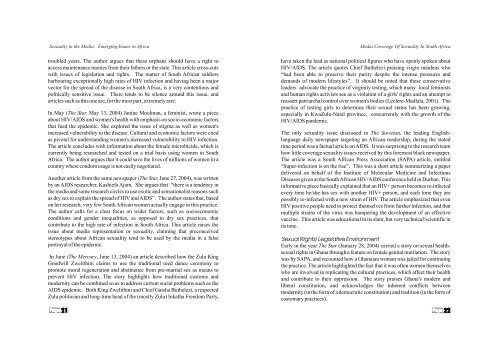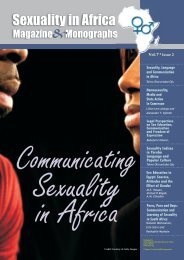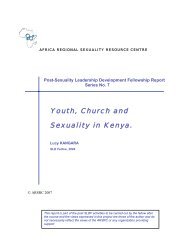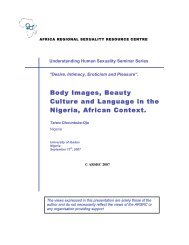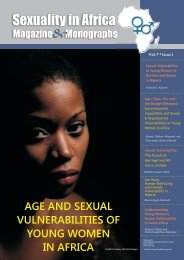Sexuality in Media: Emerging Issues in Africa - Africa Regional ...
Sexuality in Media: Emerging Issues in Africa - Africa Regional ...
Sexuality in Media: Emerging Issues in Africa - Africa Regional ...
Create successful ePaper yourself
Turn your PDF publications into a flip-book with our unique Google optimized e-Paper software.
<strong>Sexuality</strong> <strong>in</strong> the <strong>Media</strong>: Emerg<strong>in</strong>g <strong>Issues</strong> <strong>in</strong> <strong>Africa</strong><br />
troubled years. The author argues that these orphans should have a right to<br />
access ma<strong>in</strong>tenance monies from their fathers or the state. This article cross-cuts<br />
with issues of legislation and rights. The matter of South <strong>Africa</strong>n soldiers<br />
harbour<strong>in</strong>g exceptionally high rates of HIV <strong>in</strong>fection and hav<strong>in</strong>g been a major<br />
vector for the spread of the disease <strong>in</strong> South <strong>Africa</strong>, is a very contentious and<br />
politically sensitive issue. There tends to be silence around this issue, and<br />
articles such as this one are, for the most part, extremely rare.<br />
In May (The Star, May 13, 2004) Jan<strong>in</strong>e Moolman, a fem<strong>in</strong>ist, wrote a piece<br />
about HIV/AIDS and women's health with emphasis on socio-economic factors<br />
that feed the epidemic. She explored the issue of stigma as well as women's<br />
<strong>in</strong>creased vulnerability to the disease. Cultural and economic factors were cited<br />
as pivotal for understand<strong>in</strong>g women's <strong>in</strong>creased vulnerability to HIV <strong>in</strong>fection.<br />
The article concludes with <strong>in</strong>formation about the female microbicide, which is<br />
currently be<strong>in</strong>g researched and tested on a trial basis us<strong>in</strong>g women <strong>in</strong> South<br />
<strong>Africa</strong>. The author argues that it could save the lives of millions of women <strong>in</strong> a<br />
country where condom usage is not easily negotiated.<br />
Another article from the same newspaper (The Star, June 27, 2004), was written<br />
by an AIDS researcher, Kashiefa Ajam. She argues that “there is a tendency <strong>in</strong><br />
the media and some research circles to use exotic and sensationalist reasons such<br />
as dry sex to expla<strong>in</strong> the spread of HIV and AIDS”. The author states that, based<br />
on her research, very few South <strong>Africa</strong>n women actually engage <strong>in</strong> this practice.<br />
The author calls for a clear focus on wider factors, such as socioeconomic<br />
conditions and gender <strong>in</strong>equalities, as opposed to dry sex practices, that<br />
contribute to the high rate of <strong>in</strong>fection <strong>in</strong> South <strong>Africa</strong>. This article raises the<br />
issue about media representation or sexuality, claim<strong>in</strong>g that preconceived<br />
stereotypes about <strong>Africa</strong>n sexuality tend to be used by the media <strong>in</strong> a false<br />
portrayal of the epidemic.<br />
In June (The Mercury, June 13, 2004) an article described how the Zulu K<strong>in</strong>g<br />
Goodwill Zwelith<strong>in</strong>i claims to use the traditional reed dance ceremony to<br />
promote moral regeneration and abst<strong>in</strong>ence from pre-marital sex as means to<br />
prevent HIV <strong>in</strong>fection. The story highlights how traditional customs and<br />
modernity can be comb<strong>in</strong>ed so as to address current social problems such as the<br />
AIDS epidemic. Both K<strong>in</strong>g Zwelith<strong>in</strong>i and Chief Gatsha Buthelezi, a respected<br />
Zulu politician and long-time head of the (mostly Zulu) Inkatha Freedom Party,<br />
<strong>Media</strong> Coverage Of <strong>Sexuality</strong> In South <strong>Africa</strong><br />
have taken the lead as national political figures who have openly spoken about<br />
HIV/AIDS. The article quotes Chief Buthelezi prais<strong>in</strong>g virg<strong>in</strong> maidens who<br />
“had been able to preserve their purity despite the <strong>in</strong>tense pressures and<br />
demands of modern lifestyles”. It should be noted that these conservative<br />
leaders advocate the practice of virg<strong>in</strong>ity test<strong>in</strong>g, which many local fem<strong>in</strong>ists<br />
and human rights activists see as a violation of a girls' rights and an attempt to<br />
reassert patriarchal control over women's bodies (Leclerc-Madlala, 2001). The<br />
practice of test<strong>in</strong>g girls to determ<strong>in</strong>e their sexual status has been grow<strong>in</strong>g,<br />
especially <strong>in</strong> KwaZulu-Natal prov<strong>in</strong>ce, concurrently with the growth of the<br />
HIV/AIDS pandemic.<br />
The only sexuality issue discussed <strong>in</strong> The Sowetan, the lead<strong>in</strong>g Englishlanguage<br />
daily newspaper target<strong>in</strong>g an <strong>Africa</strong>n readership, dur<strong>in</strong>g the stated<br />
time period was a factual article on AIDS. It was surpris<strong>in</strong>g to the research team<br />
how little coverage sexuality issues received by this foremost black newspaper.<br />
The article was a South <strong>Africa</strong>n Press Association (SAPA) article, entitled<br />
“Super-<strong>in</strong>fection is on the rise”. This was a short article summariz<strong>in</strong>g a paper<br />
delivered on behalf of the Institute of Molecular Medic<strong>in</strong>e and Infectious<br />
Diseases given at the South <strong>Africa</strong>n HIV/AIDS conference held <strong>in</strong> Durban. This<br />
<strong>in</strong>formative piece basically expla<strong>in</strong>ed that an HIV+ person becomes re-<strong>in</strong>fected<br />
every time he/she has sex with another HIV+ person, and each time they are<br />
possibly re-<strong>in</strong>fected with a new stra<strong>in</strong> of HIV. The article emphasized that even<br />
HIV positive people need to protect themselves from further <strong>in</strong>fection, and that<br />
multiple stra<strong>in</strong>s of the virus was hamper<strong>in</strong>g the development of an effective<br />
vacc<strong>in</strong>e. This article was educational <strong>in</strong> its slant, but very technical/scientific <strong>in</strong><br />
its tone.<br />
Sexual Rights/ Legislative Environment<br />
Early <strong>in</strong> the year The Star (January 28, 2004) carried a story on sexual healthsexual<br />
rights <strong>in</strong> Ghana through a feature on female genital mutilation. The story<br />
was by SAPA, and recounted how a Ghanaian woman was jailed for cont<strong>in</strong>u<strong>in</strong>g<br />
the practice. The article highlighted the fact that it was often women themselves<br />
who are <strong>in</strong>volved <strong>in</strong> replicat<strong>in</strong>g the cultural practices, which affect their health<br />
and contribute to their oppression. The story praises Ghana's modern and<br />
liberal constitution, and acknowledges the <strong>in</strong>herent conflicts between<br />
modernity (<strong>in</strong> the form of a democratic constitution) and tradition (<strong>in</strong> the form of<br />
customary practices).


